I already posted about my favorite game of last year -- What Remains of Edith Finch -- but I liked a lot of other games last year too, so here are some recommendations and why I liked them.
I play well over a hundred games a year, for varying lengths of time, usually mostly right at the end of the year when I have time off and can devote it to sitting in front of a screen and playing for eight hours a day. Even the games I really enjoy, I often never get to go back to. My completion rate is terrible. Though this year, I did finish Gorogoa, Edith Finch, and Old Man's Journey, mostly because they are short. So bear in mind that for me, "favorite" usually means "intrigued me from a design perspective" and not necessarily "had the most fun playing." Think of this list as "games designers should play," in my opinion.
These are just in alphabetical order, by the way, not ranked in any way.
 I ended up considering this one of my favorite examples of pure design this year. The game takes on the challenge of defining a system – based on mouse movements – wherein circles grow and shrink. Sometimes they get bigger when you move up and smaller when you move down. Sometimes they grow and shrink based on your mousing speed. Your goal is to mouse a cursor around to reach an exit. There is little visual language tying the behavior of obstacles to the movement of the mouse, so you must approach each puzzle as learning a new system, yet one which is internally consistent with the ones you have learned previously. The game itself is then framed in its own visual language that encompasses all elements of the UI and basic structural stuff (level exits, etc). The extreme minimalist approach may turn off some, but I see it as a tough design challenge that was met excellently, and the way in which the game gradually teaches its own framework is actually quite reminiscent of and resonant with what Gorogoa is doing, without the narrative scaffolding.
I ended up considering this one of my favorite examples of pure design this year. The game takes on the challenge of defining a system – based on mouse movements – wherein circles grow and shrink. Sometimes they get bigger when you move up and smaller when you move down. Sometimes they grow and shrink based on your mousing speed. Your goal is to mouse a cursor around to reach an exit. There is little visual language tying the behavior of obstacles to the movement of the mouse, so you must approach each puzzle as learning a new system, yet one which is internally consistent with the ones you have learned previously. The game itself is then framed in its own visual language that encompasses all elements of the UI and basic structural stuff (level exits, etc). The extreme minimalist approach may turn off some, but I see it as a tough design challenge that was met excellently, and the way in which the game gradually teaches its own framework is actually quite reminiscent of and resonant with what Gorogoa is doing, without the narrative scaffolding.
 This game is subversive. Unfortunately, it takes a long time to get to the twists that make it so, and I almost gave up before getting to them. The entire first third of the game is a pretty bog standard flirty visual novel thing, that I basically was clicking through as fast as possible, bored out of my skull. Then (spoilers!) a character suicide, glitching, and the metafictional aspects kicked in, and it got a lot more interesting. I hesitate to describe it more, because it really is more powerful when you encounter the twists yourself. Suffice to say, it blows up visual novel design in interesting ways, while critiquing the form itself (and its content preoccupations).
This game is subversive. Unfortunately, it takes a long time to get to the twists that make it so, and I almost gave up before getting to them. The entire first third of the game is a pretty bog standard flirty visual novel thing, that I basically was clicking through as fast as possible, bored out of my skull. Then (spoilers!) a character suicide, glitching, and the metafictional aspects kicked in, and it got a lot more interesting. I hesitate to describe it more, because it really is more powerful when you encounter the twists yourself. Suffice to say, it blows up visual novel design in interesting ways, while critiquing the form itself (and its content preoccupations).
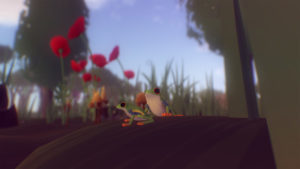 This is obviously a game as artistic statement, and it’s quite a powerful one. In this game, you play... everything. Embodying everything from virii to lizards to trees to continents to galaxies, you explore, and switch bodies, and you dance and sing. You can be a wedding ring or a quark or a herd of deer or superheated gas, and in doing so, feel the commonalities across everything there is. I feel like I have only scratched the surface of the total collection available, but I managed to cycle through what I think are all scales from the elemental to the cosmic. It’s mesmerizing and beautiful, and there are philosophy recordings as collectibles that add a lot. All in all, this felt like something beyond “game” to me, in that it's not really systemically that fascinating despite its innovation; what systems are there are not intended as challenges really so much as conceptual notions that help you explore what is in the end a giant loop of connected content. This is really great game direction, hampered only by what feels like time and budget. I could quibble with the pacing at first, and the challenge of navigation once you are in 1d space, but all in all this delivers an experience that only our medium can really deliver. Don't miss this one, it was definitely in my top five.
This is obviously a game as artistic statement, and it’s quite a powerful one. In this game, you play... everything. Embodying everything from virii to lizards to trees to continents to galaxies, you explore, and switch bodies, and you dance and sing. You can be a wedding ring or a quark or a herd of deer or superheated gas, and in doing so, feel the commonalities across everything there is. I feel like I have only scratched the surface of the total collection available, but I managed to cycle through what I think are all scales from the elemental to the cosmic. It’s mesmerizing and beautiful, and there are philosophy recordings as collectibles that add a lot. All in all, this felt like something beyond “game” to me, in that it's not really systemically that fascinating despite its innovation; what systems are there are not intended as challenges really so much as conceptual notions that help you explore what is in the end a giant loop of connected content. This is really great game direction, hampered only by what feels like time and budget. I could quibble with the pacing at first, and the challenge of navigation once you are in 1d space, but all in all this delivers an experience that only our medium can really deliver. Don't miss this one, it was definitely in my top five.
 Here's the thing... there's a lot of Gang Beasts that is TERRIBLE. No controls explanations, not even good guidance on the menus. You can launch a multiplayer melee game with only you in it and be unable to really do anything. And yet… when you play this with other people it totally comes alive, with truly fresh brawl mechanics around grabbing hold, throws, climbing, and more. You play these doughy, floppy, goofy figures in an arena brawler. It's basically a game where the awkwardness of the controls and physics themselves generate the humor. Interesting to contrast to plenty of recent fighting games, which takes themselves so so seriously and yet feel shallower (!) and to Nidhogg 2, where everything works together. Easily some of the most fun I’ve had in multiplayer recently.
Here's the thing... there's a lot of Gang Beasts that is TERRIBLE. No controls explanations, not even good guidance on the menus. You can launch a multiplayer melee game with only you in it and be unable to really do anything. And yet… when you play this with other people it totally comes alive, with truly fresh brawl mechanics around grabbing hold, throws, climbing, and more. You play these doughy, floppy, goofy figures in an arena brawler. It's basically a game where the awkwardness of the controls and physics themselves generate the humor. Interesting to contrast to plenty of recent fighting games, which takes themselves so so seriously and yet feel shallower (!) and to Nidhogg 2, where everything works together. Easily some of the most fun I’ve had in multiplayer recently.
Getting Over It with Bennett Foddy
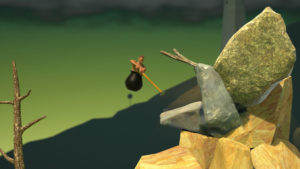 Fundamentally, a game about frustration – and therefore about games. Maybe even about Cuphead. Foddy wrings a lot out of the deliberately challenging control mechanic (a design signature of Foddy's, see QWOP), and the level design is really carefully tuned, rather exquisite actually. As a player, it maybe means I shelve the game after a while feeling like I got the point, because, well, I suck. But there's an active speedrun community out there accomplishing what looks like the impossible. Play this to get a sense of the way in which some players can make a cult of perfect play execution. And I can't shake the feeling that I should go back to it and try to get better.... Not to mention, the game itself talks to you (well, Foddy does through the game) telling you it's quite OK to give up. As a meta-commentary, that works for me rather well.
Fundamentally, a game about frustration – and therefore about games. Maybe even about Cuphead. Foddy wrings a lot out of the deliberately challenging control mechanic (a design signature of Foddy's, see QWOP), and the level design is really carefully tuned, rather exquisite actually. As a player, it maybe means I shelve the game after a while feeling like I got the point, because, well, I suck. But there's an active speedrun community out there accomplishing what looks like the impossible. Play this to get a sense of the way in which some players can make a cult of perfect play execution. And I can't shake the feeling that I should go back to it and try to get better.... Not to mention, the game itself talks to you (well, Foddy does through the game) telling you it's quite OK to give up. As a meta-commentary, that works for me rather well.
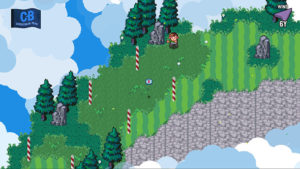 A lot of attention went towards Zelda and Mario this year, but I think I have sunk just as many hours into Golf Story. (And can I say that the Switch first year line-up is astonishingly good, perhaps the best since the Dreamcast's fabled library?). A real charmer that was a bit of a sleeper, this game manages to execute golf just about as well as hit mobile games like Golf Clash do, but wraps it in an RPG. The RPG is engaging and solid, the pacing is great, the challenges are fun and very different from typical RPG exercises… all in all, a sleeper for me, with some fun and engaging game design. The golf is fairly standard overall, swing meters and the like, but it does have stuff like gophers that steal the ball and even advanced controls, to add some depth. Also, Zelda: Breath of the Wild should have used this inventory system.
A lot of attention went towards Zelda and Mario this year, but I think I have sunk just as many hours into Golf Story. (And can I say that the Switch first year line-up is astonishingly good, perhaps the best since the Dreamcast's fabled library?). A real charmer that was a bit of a sleeper, this game manages to execute golf just about as well as hit mobile games like Golf Clash do, but wraps it in an RPG. The RPG is engaging and solid, the pacing is great, the challenges are fun and very different from typical RPG exercises… all in all, a sleeper for me, with some fun and engaging game design. The golf is fairly standard overall, swing meters and the like, but it does have stuff like gophers that steal the ball and even advanced controls, to add some depth. Also, Zelda: Breath of the Wild should have used this inventory system.
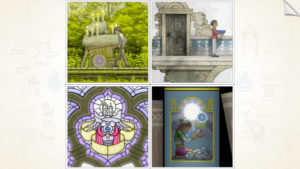 It’s art, in the best sense. The overall experience is mesmerizing, consistent, and gorgeous. The puzzles are clever yet proceed from inexorable logic. I give it a bit of a knock on the design side if only because it is basically a really amazing puzzle collection, and some of the puzzles end up vulnerable to the classic “obscurity” problem where you just have to try every possible combination before you notice something that you hadn’t tried in combination with something else. But it's all in service of delivering a lovely meditation on life, mortality, and memory that resonates beautifully in connection with Edith Finch. At first I was concerned that it was overly linear as well, but around the third fruit it opened up. It reminded me of the old Mac classic The Fool’s Errand a bit. Also one of my top five for the year.
It’s art, in the best sense. The overall experience is mesmerizing, consistent, and gorgeous. The puzzles are clever yet proceed from inexorable logic. I give it a bit of a knock on the design side if only because it is basically a really amazing puzzle collection, and some of the puzzles end up vulnerable to the classic “obscurity” problem where you just have to try every possible combination before you notice something that you hadn’t tried in combination with something else. But it's all in service of delivering a lovely meditation on life, mortality, and memory that resonates beautifully in connection with Edith Finch. At first I was concerned that it was overly linear as well, but around the third fruit it opened up. It reminded me of the old Mac classic The Fool’s Errand a bit. Also one of my top five for the year.
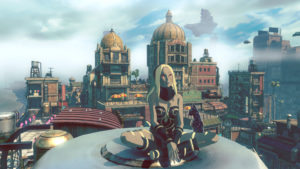 A sleeper for me – I didn’t play the original. We get an evocative opening, followed by a tense rush and movement tutorial, and after a moderately dull “learn the map” exploration sequence, the game unveils a really fun and weird gravity-based control scheme set in an world that draws from some of the better choices for anime inspiration. The characters are great, the art is very good. Level design is somewhat punishing, and harmed a lot by the uniform palette of colors and shapes which make “find the character” challenges and quests an exercise in annoyance. Even so, there's a freshness here that most JRPGs simply don't hit for me. This is one of the games out of the set that I’d be inclined to come back to, on a personal level, because I found it engaging.
A sleeper for me – I didn’t play the original. We get an evocative opening, followed by a tense rush and movement tutorial, and after a moderately dull “learn the map” exploration sequence, the game unveils a really fun and weird gravity-based control scheme set in an world that draws from some of the better choices for anime inspiration. The characters are great, the art is very good. Level design is somewhat punishing, and harmed a lot by the uniform palette of colors and shapes which make “find the character” challenges and quests an exercise in annoyance. Even so, there's a freshness here that most JRPGs simply don't hit for me. This is one of the games out of the set that I’d be inclined to come back to, on a personal level, because I found it engaging.
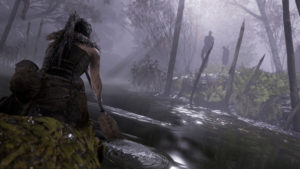 It's interesting to contrast this to the very very different RiME. Both are fundamentally linear 3rd person adventure puzzlers. Each has a feature or two the other doesn't (combat, herding), but at formalist heart, they aren't that different. But they do end up different, thanks to Hellblade's focus on unreliable narration grounded in an extremely realistic presentation -- it's a game where you feel the challenges of mental illness (voices in your head, hallucinations, and other symptoms of psychosis) whilst traversing a landscape that is exactly what we mean when we use the hackneyed phrase "a descent into madness," full of corpses on spikes and horrific scenes. In the process, it deconstructs that phrase, grounding the environment in realism including fairly accurate depictions of the Picts and Norse. There's even a metafictional element to the portrayal of the psychosis, with one of the voices aware that there is in fact a player playing the game. Intense and emotionally challenging, this is one to look at in order to appreciate the ways in which a narrative layer can massively reinforce and reframe mechanics, aided by stellar voice acting.
It's interesting to contrast this to the very very different RiME. Both are fundamentally linear 3rd person adventure puzzlers. Each has a feature or two the other doesn't (combat, herding), but at formalist heart, they aren't that different. But they do end up different, thanks to Hellblade's focus on unreliable narration grounded in an extremely realistic presentation -- it's a game where you feel the challenges of mental illness (voices in your head, hallucinations, and other symptoms of psychosis) whilst traversing a landscape that is exactly what we mean when we use the hackneyed phrase "a descent into madness," full of corpses on spikes and horrific scenes. In the process, it deconstructs that phrase, grounding the environment in realism including fairly accurate depictions of the Picts and Norse. There's even a metafictional element to the portrayal of the psychosis, with one of the voices aware that there is in fact a player playing the game. Intense and emotionally challenging, this is one to look at in order to appreciate the ways in which a narrative layer can massively reinforce and reframe mechanics, aided by stellar voice acting.
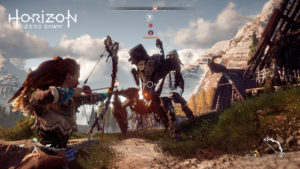 Unquestionably a standout for the year. Rich gameplay mechanics, and a stellar job of unveiling an open world environment that rivals the best I’ve seen from more established series like Tomb Raider. A very interesting IP as well, with appealing characters. Basically, if game direction is about everything working together, this is one of the best I’ve seen in a while. It gets boosted by its freshness – a new world, interesting and fresh stealth mechanics, diverse weapon types with new effects, etc. It's not as experimental as most of the titles on this list -- it, like Uncharted: Lost Legacy and Super Mario Odyssey, are basically "just" triumphs of development execution against mostly familiar game design challenges. But we shouldn't minimize what an achievement that is, when it's pulled off as well as it is here.
Unquestionably a standout for the year. Rich gameplay mechanics, and a stellar job of unveiling an open world environment that rivals the best I’ve seen from more established series like Tomb Raider. A very interesting IP as well, with appealing characters. Basically, if game direction is about everything working together, this is one of the best I’ve seen in a while. It gets boosted by its freshness – a new world, interesting and fresh stealth mechanics, diverse weapon types with new effects, etc. It's not as experimental as most of the titles on this list -- it, like Uncharted: Lost Legacy and Super Mario Odyssey, are basically "just" triumphs of development execution against mostly familiar game design challenges. But we shouldn't minimize what an achievement that is, when it's pulled off as well as it is here.
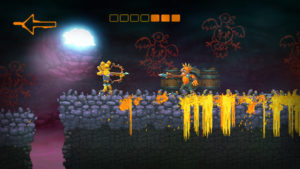 This game rocks. The pixel art is gorgeous. The controls are tuned to precision. The weapons mechanics are deep and diverse, with a rock-paper-scissors depth that is really elegant (I love the rapier, but boy, it is harder to block thrown weapons or bow shots with it!). The territory mechanic combined with the level structure (doors, platforms, varying height, traps, etc) and weapon variety reward multiple play strategies, from aggressive to extremely careful ranged play. Just really great design here that clicks intuitively. I suspect it has to be played multiplayer to really be appreciated. Out of the various head to head fighting games this year, this was easily the best.
This game rocks. The pixel art is gorgeous. The controls are tuned to precision. The weapons mechanics are deep and diverse, with a rock-paper-scissors depth that is really elegant (I love the rapier, but boy, it is harder to block thrown weapons or bow shots with it!). The territory mechanic combined with the level structure (doors, platforms, varying height, traps, etc) and weapon variety reward multiple play strategies, from aggressive to extremely careful ranged play. Just really great design here that clicks intuitively. I suspect it has to be played multiplayer to really be appreciated. Out of the various head to head fighting games this year, this was easily the best.
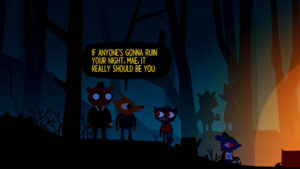 Sometimes, as with Doki Doki Literature Club or this title, there's a reluctance to hop on the bandwagon of Tumblr popularity. Don't let that stop you from trying out Night in the Woods. A blend of platformer, rhythm game (!), and straight-up narrative adventure game, Night in the Woods succeeds on the strength of its writing, which evokes a very specific small town and a host of fascinating characters, with humor and affection, and a keen cognizance of their personality flaws. The execution is excellent all the way down the care taken with chat bubbles; it says something when your top complaint about a title's polish is that too many unmissable jokes are hidden behind having to talk to every character three times (it gets a tad tedious). The IP design is an object lesson in appeal to a modern younger audience: a broad cast of characters in which almost anyone can find someone to identify with, practically designed to be doodled in fan art. This is an area that more developers need to pay attention to, as that sort of emotional connection to characters is going to vital for standing out in crowded markets. NitW nails that gushing "Oh, I love her" affectionate reaction from a cosplayer in a way that few titles do.
Sometimes, as with Doki Doki Literature Club or this title, there's a reluctance to hop on the bandwagon of Tumblr popularity. Don't let that stop you from trying out Night in the Woods. A blend of platformer, rhythm game (!), and straight-up narrative adventure game, Night in the Woods succeeds on the strength of its writing, which evokes a very specific small town and a host of fascinating characters, with humor and affection, and a keen cognizance of their personality flaws. The execution is excellent all the way down the care taken with chat bubbles; it says something when your top complaint about a title's polish is that too many unmissable jokes are hidden behind having to talk to every character three times (it gets a tad tedious). The IP design is an object lesson in appeal to a modern younger audience: a broad cast of characters in which almost anyone can find someone to identify with, practically designed to be doodled in fan art. This is an area that more developers need to pay attention to, as that sort of emotional connection to characters is going to vital for standing out in crowded markets. NitW nails that gushing "Oh, I love her" affectionate reaction from a cosplayer in a way that few titles do.
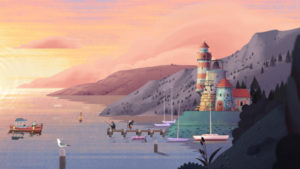 Another commonality across games this year was meditations on loss and mortality. Old Man's Journey is a poetic game, heavily reliant on quiet mood-setting and stunningly beautiful visuals, that also offers up some relatively lightweight but interesting puzzle play. Taken in the abstract, the puzzle could easily have been done in a manner akin to Circles (only with lines and arcs), and would likely have lost its charm pretty quickly. As a designer whose puzzle designs often lean abstract, this was an object lesson in how to infuse dry mechanics with rich emotional content.
Another commonality across games this year was meditations on loss and mortality. Old Man's Journey is a poetic game, heavily reliant on quiet mood-setting and stunningly beautiful visuals, that also offers up some relatively lightweight but interesting puzzle play. Taken in the abstract, the puzzle could easily have been done in a manner akin to Circles (only with lines and arcs), and would likely have lost its charm pretty quickly. As a designer whose puzzle designs often lean abstract, this was an object lesson in how to infuse dry mechanics with rich emotional content.



































